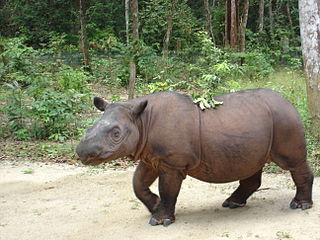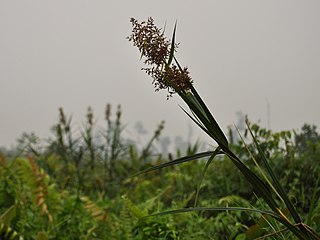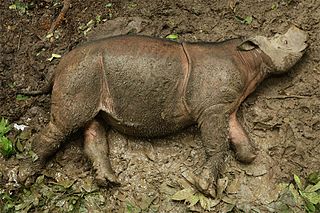
The Sumatran rhinoceros, also known as the Sumatran rhino, hairy rhinoceros or Asian two-horned rhinoceros, is a rare member of the family Rhinocerotidae and one of five extant species of rhinoceros; it is the only extant species of the genus Dicerorhinus. It is the smallest rhinoceros, although it is still a large mammal; it stands 112–145 cm (44–57 in) high at the shoulder, with a head-and-body length of 2.36–3.18 m and a tail of 35–70 cm (14–28 in). The weight is reported to range from 500–1,000 kg (1,100–2,200 lb), averaging 700–800 kg (1,540–1,760 lb). Like both African species, it has two horns; the larger is the nasal horn, typically 15–25 cm (5.9–9.8 in), while the other horn is typically a stub. A coat of reddish-brown hair covers most of the Sumatran rhino's body.

A rhinoceros, commonly abbreviated to rhino, is a member of any of the five extant species of odd-toed ungulates in the family Rhinocerotidae; it can also refer to a member of any of the extinct species of the superfamily Rhinocerotoidea. Two of the extant species are native to Africa, and three to South and Southeast Asia.

Dicerorhinus is a genus of the family Rhinocerotidae, consisting of a single extant species, the two-horned Sumatran rhinoceros, and several extinct species. The genus likely originated in the Mid to Late Pliocene of Northern Indochina and South China. Many species previously placed in this genus probably belong elsewhere.

Erigeron sumatrensis is an annual herb probably native to South America, but widely naturalised in tropical and subtropical regions, and regarded as an invasive weed in many places.

Rhizomys, also known as bamboo rat, is a genus of rodents in the family Spalacidae. Rhizomys are all stocky burrowers with short, naked tails, and contains the following species:

The large bamboo rat, Sumatran rat, or Indomalayan rat is a species of rodent in the family Spalacidae found in Cambodia, China, Indonesia, Laos, Malaysia, Myanmar, Thailand, and Vietnam. It is one of four species of bamboo rat. Individuals can reach lengths of nearly 50 cm (20 in) with a 20 cm (7.9 in) tail, and weigh up to 4 kilograms (8.8 lb).

Erebus sumatrensis is a moth of the family Erebidae. It is found on Sumatra.
Tactusa is a genus of moths of the family Erebidae. The genus was erected by Michael Fibiger in 2010.

Scleria sumatrensis, commonly known as nutrush and Sumatran scleria, is a plant species in the sedge family. It is native to temperate and tropical Asia, where it is usually found growing in wetlands, and is considered a noxious weed on the island of Borneo. It has been used in traditional medicine against gonorrhea.
Seguenzia sumatrensis is a species of extremely small deep water sea snail, a marine gastropod mollusk in the family Seguenziidae.

Filopaludina sumatrensis is a species of large freshwater snail with a gill and an operculum, an aquatic gastropod mollusk in the family Viviparidae.
Ectatosia is a genus of longhorn beetles of the subfamily Lamiinae, containing the following species:

The Northern Sumatran rhinoceros, also known as Chittagong rhinoceros or northern hairy rhinoceros, was the most widespread subspecies of Sumatran rhinoceros, as well as the only known subspecies native to mainland Asia.
Ectatosia invitticollis is a species of beetle in the family Cerambycidae. It was described by Stephan von Breuning in 1961.
Ectatosia moorei is a species of beetle in the family Cerambycidae. It was described by Pascoe in 1857. It is known from Java, Borneo and Sumatra.

The Bornean rhinoceros, also known as the eastern Sumatran rhinoceros or eastern hairy rhinoceros, is one of three subspecies of Sumatran rhinoceros. The subspecies was feared to be functionally extinct, with only one individual, a female named Pahu, surviving in captivity, and held in the state of Sabah. In April 2015, the Malaysian government declared the Bornean rhinoceros to be extinct in the wild in the Malaysian portion of Borneo. However, in March 2016, a young female rhino was captured in East Kalimantan, providing evidence of their continued existence. The International Union for Conservation of Nature (IUCN) classifies the subspecies as critically endangered.
Obereopsis sumatrensis is a species of beetle in the family Cerambycidae. It was described by Stephan von Breuning in 1951.

The Indochinese blue flycatcher is a species of bird in the family Muscicapidae. It is found from southern Myanmar and the Malay Peninsula to Indochina and northeastern Sumatra. It was previously considered conspecific with Tickell's blue flycatcher.

Larutia sumatrensis is a species of skink. It is endemic to Sumatra (Indonesia).











